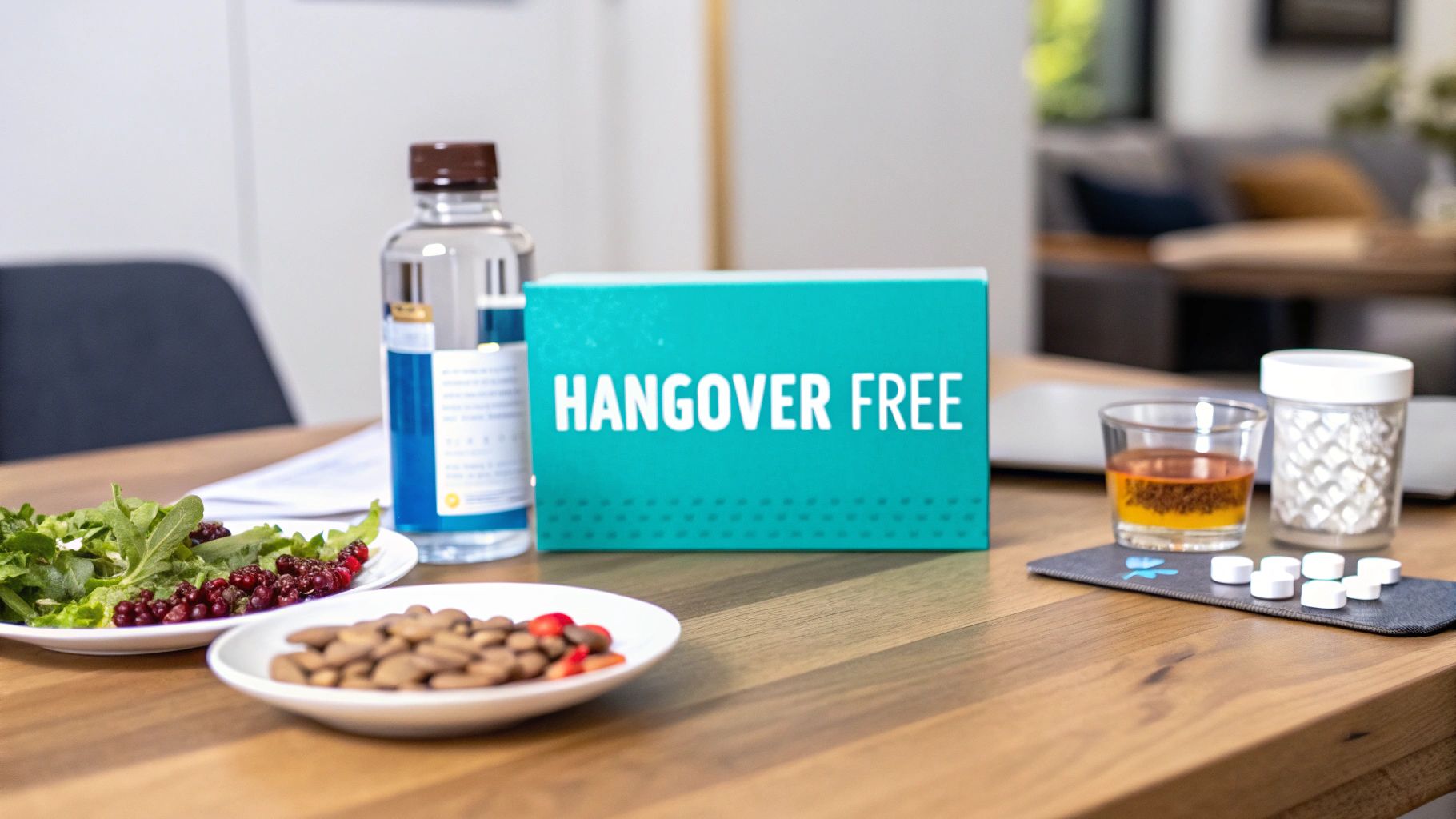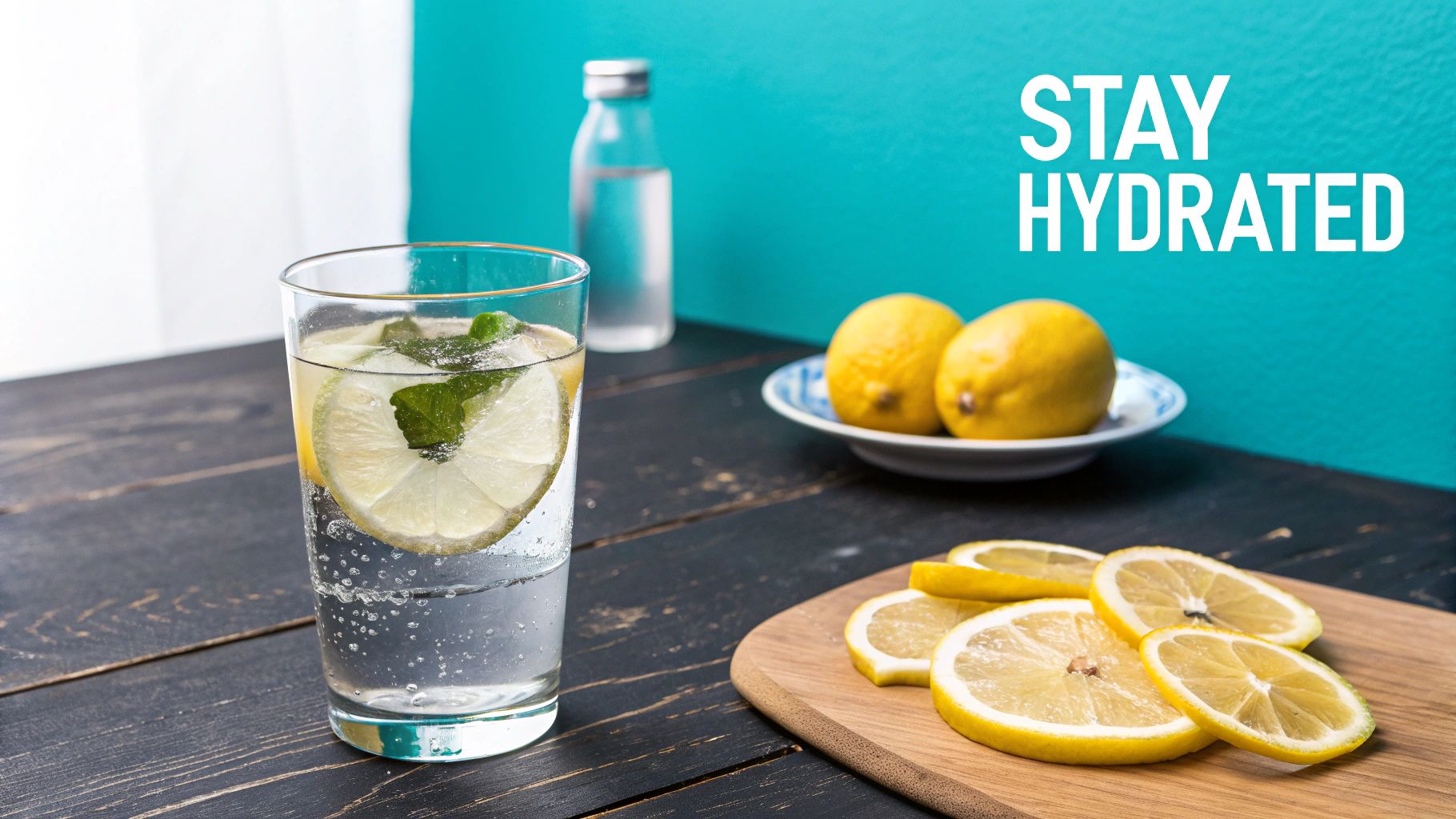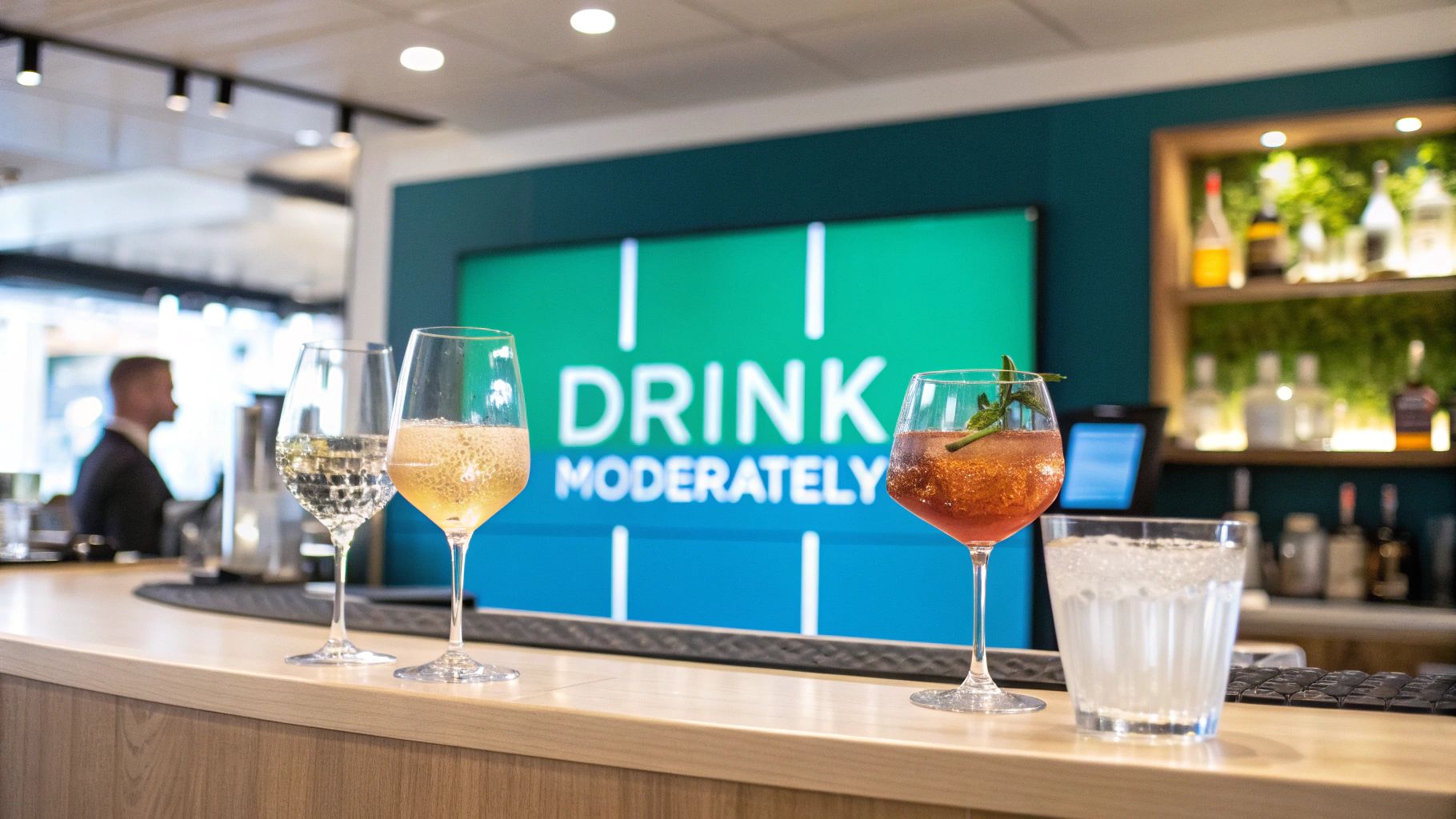

· By Annemarie
How to Prevent Hangover Before Drinking: Expert Tips
The Science Behind Hangovers: What's Really Happening

That dreaded morning-after feeling isn't just dehydration; it's a complex process. Understanding how alcohol affects your body is key to preventing a hangover. This means looking past simple "cures" and diving into the science.
Alcohol's Journey Through Your System
Alcohol doesn't just passively exist in your body after you drink it. Your body actively processes it, starting in the stomach where a small amount is absorbed. Most of the alcohol, however, moves to the small intestine. Here, it's quickly absorbed into the bloodstream. This means that what you eat before drinking affects how quickly you feel the effects.
Dehydration: A Major Player
One of the most common effects of alcohol is dehydration. Alcohol suppresses the antidiuretic hormone (ADH). This hormone signals your kidneys to conserve water. Increased urination and fluid loss contribute to classic hangover symptoms like headache and dry mouth. But dehydration is just one part of the story.
Inflammation and Congeners: The Hidden Culprits
Inflammation is another key factor in hangovers. Alcohol can trigger inflammatory responses throughout the body, making symptoms worse. Congeners, chemicals produced during alcohol fermentation, can also worsen hangovers. Darker liquors like whiskey and red wine generally have more congeners than lighter drinks like vodka or gin. This is something to keep in mind when choosing your drinks.
Individual Factors: Why Some Suffer More
Hangovers affect everyone differently. Genetics, body composition, and even gender play a role in how your body processes alcohol. This explains why some people recover quickly while others have severe hangovers. Interested in learning more? Check out this resource: How to master....
The demand for hangover prevention solutions is increasing globally. In 2023, the UK held 23.3% of the European market share for hangover cure products. This shows a strong interest in managing hangovers proactively. Find more detailed statistics here. This increasing awareness highlights how important it is to understand hangover science.
Hydration Mastery: Beyond Just Drinking Water

Dehydration plays a big role in hangovers. However, just drinking water isn't always enough. We need to be strategic about how we hydrate to prevent a hangover before it even begins. It's all about preparing your body, right down to the cellular level, for the effects of alcohol.
Pre-Hydration Protocol: Timing Is Everything
Start hydrating well before you have your first drink. Think of it like this: you need to prime the pump and get those fluids flowing. Ideally, begin hydrating several hours before you plan on drinking. This gives your body ample time to absorb the water and reach optimal hydration. This preemptive hydration can significantly reduce the dehydrating effects of alcohol.
Electrolyte Enhancement: The Missing Link
Water alone isn't the complete solution. Alcohol depletes electrolytes, essential minerals that regulate fluid balance in the body. Adding electrolytes to your pre-drinking hydration routine helps your body maintain this balance. Consider electrolyte tablets or powders to add to your water, or consume electrolyte-rich foods like bananas or coconut water.
Hydration Hacks From the Pros: Stay Ahead of the Curve
Professional athletes know the importance of proper hydration. They often use specific hydration techniques like pre-loading with electrolytes and timed fluid intake. These strategies, while designed for peak performance, can also help prevent hangover symptoms. Instead of chugging water all at once, sip smaller amounts consistently in the hours leading up to your first alcoholic beverage.
This attention to detail is a key element of successful hangover prevention. Interestingly, the market for hangover solutions is growing rapidly, especially in the U.S. In 2023, the U.S. led the market, driven by lifestyle changes and a focus on preventative measures. Find more detailed statistics here. Consistent hydration during the evening itself is also important.
To help illustrate different hydration approaches, let's look at a comparison table:
Hydration Solutions Comparison
Comparison of different hydration approaches before drinking alcohol
| Hydration Method | Effectiveness Rating | Timing Before Drinking | Key Benefits | Potential Drawbacks |
|---|---|---|---|---|
| Water Only | Moderate | Several hours before | Simple, readily available | Less effective at replenishing electrolytes |
| Electrolyte Drinks/Tablets | High | Several hours before | Replenishes electrolytes, improves hydration | May have added sugars or artificial ingredients |
| Electrolyte-Rich Foods (Bananas, Coconut Water) | Moderate | Several hours before | Natural source of electrolytes, provides other nutrients | May not provide sufficient electrolyte levels for heavy drinking |
| Consistent Sipping of Water/Electrolyte Drinks Throughout the Evening | High | Throughout the evening | Maintains hydration levels, prevents dehydration from setting in | Requires conscious effort and planning |
As this table demonstrates, combining various hydration methods and timing your intake strategically offers the best protection against dehydration.
Practical Hydration During Drinking: Sip, Don't Chug
Constantly running to the bathroom can be disruptive. The key is to maintain steady hydration while enjoying your drinks. Alternate alcoholic beverages with water or non-sugary electrolyte drinks. This paced approach keeps you hydrated without overfilling your bladder. It’s a simple but effective strategy for enjoying a night out without the consequences the next day.
Strategic Eating: The Pre-Drinking Meal Blueprint

What you eat before drinking significantly impacts how you feel the next day. Think of your stomach as your body's initial defense against a hangover. Planning your pre-drinking meal strategically can drastically reduce alcohol's negative effects. This isn't just about "lining your stomach"—it's about providing your body with the resources it needs for efficient alcohol processing. You might be interested in: How to master....
The Power of Protein, Fats, and Carbs
Specific nutrients are essential in how your body manages alcohol. Protein, for instance, slows the absorption of alcohol into your bloodstream. This allows the alcohol to enter your system gradually, giving your liver more time to process it and lessening the intensity of a potential hangover.
Healthy fats are also vital. They create a protective barrier for your stomach lining against alcohol's irritating effects. Think of it as adding a cushion. However, choose wisely. Avoid unhealthy fats, which can worsen hangover symptoms. Instead, opt for healthy fats found in avocados, nuts, and salmon. These provide the necessary protection without adding to the digestive strain.
Complex carbohydrates provide sustained energy throughout the night. Alcohol can decrease blood sugar levels, leading to fatigue and weakness. Complex carbs offer a slow-release energy source, maintaining stable blood sugar and energy levels, and combating that drained feeling.
Meal Formulas for Different Drinking Scenarios
Different drinking occasions call for different pre-drinking approaches. For a casual happy hour, a lighter meal containing lean protein, healthy fats, and complex carbs is perfect. A salad with grilled chicken or fish, avocado, and quinoa is an excellent option.
For longer events like a wedding reception, a more substantial meal with increased protein and complex carbohydrates is beneficial. Salmon with roasted vegetables and brown rice, for example, delivers lasting energy and helps regulate alcohol absorption. These combinations prepare your body for a night of drinking, minimizing the risk of a hangover.
The following table provides some helpful examples of pre-drinking meals and their effectiveness:
Pre-Drinking Food Effectiveness
Analysis of different food categories and their effectiveness in preventing hangovers
| Food Category | Hangover Prevention Rating | Key Nutrients | Recommended Timing | Example Meals |
|---|---|---|---|---|
| Lean Protein | High | Amino acids | 1-2 hours before drinking | Grilled chicken salad, Salmon with roasted vegetables |
| Healthy Fats | Medium | Omega-3 fatty acids | 1-2 hours before drinking | Avocado toast, Nuts and seeds |
| Complex Carbohydrates | High | Fiber, Vitamins, Minerals | 2-3 hours before drinking | Quinoa salad, Brown rice with vegetables |
| Sugary Foods | Low | Simple sugars | Avoid before drinking | Candy, Pastries |
| Processed Foods | Low | Unhealthy fats, Additives | Avoid before drinking | Fast food, Frozen meals |
This table highlights the importance of choosing nutrient-rich foods before drinking to minimize hangover symptoms. Lean protein, healthy fats, and complex carbohydrates are your best allies in this endeavor. Avoid sugary and processed foods, as they offer little protection and can exacerbate negative effects.
Interestingly, preventing hangovers is gaining increasing attention, especially in the Asia Pacific region. This region held 54.4% of the global market for hangover cure products in 2023. This shows a growing demand for preventative measures, including supplements and specific foods, before drinking. Learn more about this trend here. This reinforces the value of proactively minimizing hangover symptoms, starting with a strategic pre-drinking meal.
Supplement Strategies That Actually Work

Navigating the supplement aisle for hangover prevention can be overwhelming. Marketing claims often outshine real scientific evidence. This section aims to clarify which supplements are actually backed by research, helping you make informed choices and potentially prevent a hangover before it starts. It’s all about understanding how to best support your body’s natural detoxification processes.
B Vitamins: Supporting Alcohol Metabolism
B vitamins play a vital role in how your body metabolizes alcohol. They assist your system in breaking down alcohol more efficiently. This can potentially lessen the duration and intensity of hangover symptoms. B-complex vitamins, encompassing a variety of essential B vitamins, are particularly helpful in this regard.
Not all B vitamin supplements are formulated equally. Look for a supplement containing a well-rounded mix of B vitamins, especially B1 (thiamine), B3 (niacin), and B6 (pyridoxine). These vitamins work together to support your liver’s detoxification efforts. Taking a B-complex supplement before consuming alcohol can give your body an advantage in processing it.
Milk Thistle and NAC: Liver Protection Powerhouses
Your liver is your main line of defense against the negative effects of alcohol. Milk thistle and N-acetyl cysteine (NAC) are two supplements known for their liver-protective qualities. Milk thistle contains silymarin, an antioxidant that may help protect liver cells from damage.
NAC is a precursor to glutathione, a crucial antioxidant. Alcohol consumption can deplete glutathione levels, and NAC helps replenish them, bolstering your liver’s ability to remove toxins. By supporting liver function, these supplements may play a key role in hangover prevention.
Timing is Key: Pre-Drinking Supplementation
Similar to hydrating and eating before drinking, taking supplements beforehand is crucial for optimal effectiveness. This allows them to enter your system and prepare your body for alcohol processing. Think of it as proactively fortifying your defenses.
For instance, taking B vitamins a few hours before you drink allows them to be readily available when your body needs them most. This proactive approach can make a significant difference in how your body handles alcohol.
Personalized Protocol: Building Your Strategy
Your supplement strategy should be tailored to your individual needs. Factors such as your drinking habits, overall health, and individual physiology can influence which supplements work best for you.
Consider consulting with a healthcare professional or a registered dietitian to develop a personalized supplement plan. This personalized approach can help ensure you’re receiving the right support and minimizing your risk of a hangover.
Drink Smarter: Beverage Selection and Pacing Tactics
The choices you make about your beverages and your drinking pace significantly impact how you feel the next day. Understanding the science behind alcohol and adopting smart strategies can dramatically reduce your hangover risk. It's not just about how much you drink; it's also about what and how you drink.
The Congener Conundrum: Choosing Your Drinks Wisely
Not all alcoholic beverages are the same. Congeners, byproducts of fermentation, give drinks their color and flavor, but also worsen hangovers. Darker liquors like whiskey and red wine generally have higher congener levels than clear spirits like vodka or gin.
This doesn't mean you must completely avoid your favorite dark liquors. Being mindful of congener content helps you make informed decisions. Opting for a lighter, highly filtered whiskey might be gentler than a darker, less filtered option.
Mixing Drinks: Separating Fact From Fiction
The saying "beer before liquor, never been sicker" isn't entirely true. The real issue is usually the total amount of alcohol consumed, not the order. However, mixing different types of alcohol can upset your stomach, potentially making hangover symptoms worse.
While sticking to one type of alcohol can help, moderation and awareness are key. Notice how different drinks affect you and adjust your choices accordingly. This personalized approach is often better than following general rules.
Pacing Yourself Like a Pro: Timing Is Everything
Industry professionals at alcohol-related events often use clever pacing techniques. One technique is alternating alcoholic drinks with water or non-alcoholic beverages. This helps you stay hydrated and slows down alcohol consumption without disrupting socializing. It’s a subtle yet effective hangover prevention strategy.
Another good tactic is to avoid “chugging.” Sipping drinks slowly lets your body process the alcohol more efficiently. This reduces strain on your liver and can significantly lower your hangover risk. You might be interested in: How to master....
Building Your Personal Drinking Framework
A personalized drinking framework is crucial for consistently preventing hangovers. Consider your individual tolerance, preferred drinks, and typical social settings. By understanding your personal triggers and creating strategies to manage them, you can enjoy alcohol responsibly and minimize hangover risk. This proactive approach helps you make smart choices and control your drinking experience.
Lifestyle Optimization: Building Hangover Resistance
Your body's response to alcohol isn't set in stone. You can actively improve how your body handles alcohol and minimize those dreaded hangovers. Just like athletes train for peak performance, you can train your body to manage alcohol's effects. Focusing on lifestyle factors like sleep, exercise, and stress management builds genuine hangover resistance and improves your overall well-being.
The Power of Sleep: Supporting Liver Detoxification
Sleep is vital for liver regeneration and detoxification. While you sleep, your liver processes alcohol and its byproducts. Getting enough quality sleep allows your liver to function optimally. This, in turn, reduces hangover severity. Consistent sleep patterns before and after drinking can significantly aid your body's recovery.
Exercise and Alcohol Metabolism: A Synergistic Relationship
Regular physical activity boosts circulation and metabolism, which are key to how your body processes alcohol. This improved efficiency can lessen the impact of alcohol and potentially reduce hangover symptoms. Adjusting your exercise routine around a drinking event can further optimize how your body handles alcohol. For instance, a light workout the day after drinking can help clear toxins and improve circulation.
Stress Management: Minimizing Hangover Severity
Stress heavily influences how your body reacts to alcohol. High stress levels can exacerbate hangover symptoms. Incorporating stress-reduction techniques, such as deep breathing exercises, yoga, or meditation, can help mitigate this. Managing stress effectively improves overall well-being and potentially reduces the severity of future hangovers.
Practical Techniques for Hangover Resistance
Building hangover resistance means integrating specific practices into your daily routine:
-
Pre-Drinking Preparation: Before a planned drinking event, prioritize hydration, healthy eating, regular exercise, and quality sleep. This prepares your body to better manage alcohol’s effects.
-
Hydration Beyond Water: Electrolyte drinks can help replenish essential minerals lost through alcohol consumption.
-
Balanced Nutrition: Focus on a diet rich in lean protein, healthy fats, and complex carbohydrates, especially before drinking.
-
Smart Supplementation: Consult with a healthcare professional about supplements with liver-protective properties, such as milk thistle and NAC.
These lifestyle adjustments not only minimize hangovers, they contribute to better overall health. Taking a proactive approach to alcohol consumption is an investment in your long-term well-being.
Ready to upgrade your drinking experience and minimize those dreaded hangovers? Upside Hangover Sticks offer a convenient and effective solution. Developed with proven natural ingredients, Upside helps you enjoy your social life without the morning-after consequences. Try Upside today and experience the difference: https://enjoyupside.com
